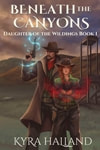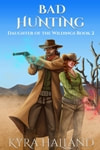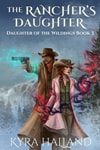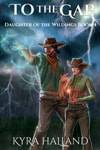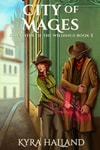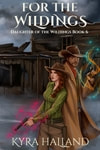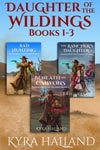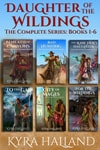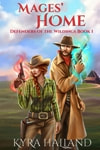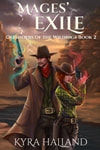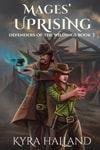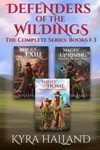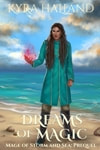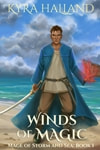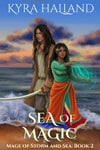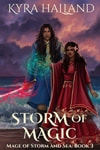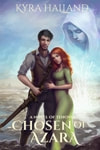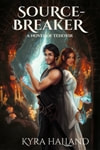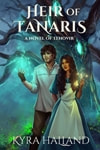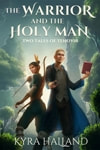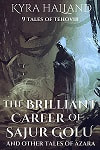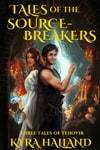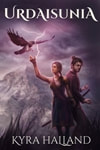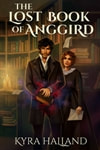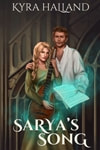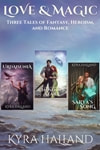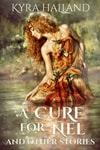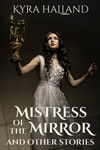|
Just got the preview files of the cover art for Daughter of the Wildings Book 2, which now has a title: Bad Hunting. Here's the full wraparound for the paperback version: And here's the ebook version: Many thanks to me-illuminated (Mominur Rahman) for this awesome art! To see more of his work, go to me-illuminated.deviantart.com.
0 Comments
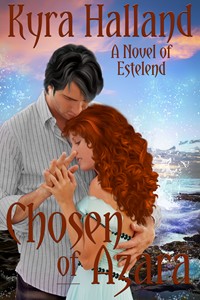 For some reason, whenever I count up how many complete novels I've written, I always seem to forget that, buried deep in the "Old Stories" folder in my Projects folder on my computer is a complete draft of the original version of the story that eventually become Chosen of Azara. I was reading back over it yesterday (very gingerly, in the same manner that you might remove that big chunk of prickly pear that's gotten itself stuck in the sole of your sneaker, because too much contact would be painful) and was surprised at how many elements of the original story made it into Chosen of Azara (along with some that, thankfully, didn't). The seed of the idea that eventually turned into that first novel and finally matured into Chosen of Azara was an image that came into my mind one day, of a highborn young woman alone in the woods, seeing a vision of an unknown man, and then some time later, the man appears, in the flesh, at the door of her home, looking for her. The earlier story starts with that scene and goes on with the adventure from there. I also discovered that the first story also has a magical talisman that the young woman wears as a necklace, two brothers, a dubious fiance, a lost kingdom, and a king who under normal circumstances should be waaaaay past his "for best quality, use by" date. And, like Chosen of Azara, it's also set in the world of Estelend which I had begun developing probably about the same time or a little earlier. A lot of writers, especially newer ones, worry that just because one story has the same starting premise and even some more specific plot elements in common with another story, that that makes the two stories the same. You see this on the NaNoWriMo boards a lot - "Am I plagiarizing [movie or book] by having [incredibly broad and common story element] in my story?" (Someone wanted to know if they were plagiarizing George R.R. Martin by including sex in their fantasy novel.) Or, "This movie stole my plot!" Young wizards going to wizard school (A Wizard of Earthsea, anyone?) or characters who are half-human, half-god (a substantial chunk of Greek mythology) seem to cause particular concern. The answer is, No, you're not plagiarizing, No one stole your idea, There are no ideas that have absolutely never been done before. Two writers can start out with remarkably similar premises, and even some specific plot elements, and end up with very different stories. And, in fact, the SAME author can write two very different stories from the same starting point and with the same plot elements. The original "girl sees strange man in a vision in the forest" story is pretty straightforward. Girl sees vision, dude shows up, girl (accompanied by brothers and dubious fiance) goes off on adventure with mystery dude, lost kingdom, yada yada, (eventual) happy ending. I wasn't real happy with how that story came out, and in fact the girl got a name and personality change halfway through. She started out as kind of this pathetic spinster would-be-hermit, and eventually eveolved into someone more like the character of Lucie turned out to be. Aside from the main character, the story as a whole didn't do what I wanted it to do, and it certainly didn't do justice to my original idea of the man in the vision. So I turned my mind (aka the Idea-o-Tron (TM)) to learning more about the guy in the visions. Ancient king, lost kingdom... How in the world is he showing up in visions in the woods right here, right now, to this particular young lady? I started digging more into that, and that was where Sevry and his story (and the very cool time travel technique) came from. But there was more to it than that; how did the war begin, that destroyed Sevry's kingdom? Kingdom-annihilating wars don't just come out of nowhere. So that led deeper into Savaru's history, and to the story of Juzeva. By the time I'd worked out all this backstory, I realized it wasn't just backstory; the stories of Juzeva and Sevry were too closely connected to Lucie's story, and had too much important information, and were too compelling to me to just be relegated to backstory, to be worked in small chunks into the story of Lucie's adventure. So the new version of the novel started with Juzeva and became an inter-generational tale of the fall and restoration of the kingdom of Savaru. And it turned into a novel that I decided I loved, and was proud to publish (as opposed to the original version, which will remain in the privacy of my hard drive; though I'll never delete it because you never know when something from an old story can be recycled into a new one.) 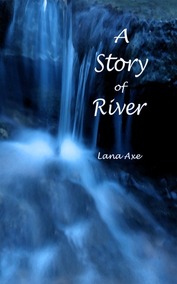 A Story of River, by Lana Axe (read my interview with Lana Axe here) Kyra's Star Ratings: Story: * * * * Characters: * * * Writing: * * * * Emotional Engagement: * * * In A Story of River, a traditional fantasy, elven and human lands are being attacked by an evil sorceror, and an unlikely band of human and elven allies seek the help of River, a powerful water elemental. I found the story enjoyable, and Ms. Axe's traditional fantasy world is charming. The writing is clear and well-crafted, with a minimum of errors (mainly some verb tense issues). The parts with the antagonist, Ulda, were particularly interesting. He's deliciously nasty and ruthless, with a vivid personality and some really cool magic using gems and living souls. Other than these parts, though, I felt like the novel was just skimming the surface of the story. I would have liked to dig deeper into the minds, hearts, and personalities of the protagonists. There wasn't a lot other than name, position, and race (elf or human) to differentiate them, and the events of the story didn't seem to affect them very deeply. In particular, when one character died, it seemed to have only a brief and minimal impact on the other characters, even the ones who should have been devastated by that character's death. I as a reader was affected by the death of this character, who was one of the more vivid characters, and I was disappointed at the death's lack of impact on the story. In addition, I would have liked more physical description of the characters and their surroundings. A few details are given, but not enough to help me feel grounded in and surrounded by what is really a very charming and interesting fantasy world. I also would have liked to have more description of what the characters are experiencing physically as they go through their adventure, to engage my mind and senses more fully in the story. I wouldn't really consider these things to be faults in the novel; rather, they are ways in which a lot more could have been done with the novel to help it live up to its great potential. Basically, what I'm getting at with this review is I enjoyed A Story of River and wanted more - not in length (the plot developed and resolved quite nicely and doesn't need to be longer) but in depth. On the whole, A Story of River is an entertaining, nicely-written read, suitable for young teens through adults. I understand it's Ms. Axe's first novel, and I look forward to more books from her and to watching her development as an author. 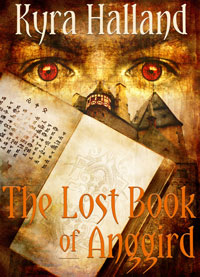 Every author has one. The Book of Eternal Revisions, where you need "just one more draft" to make it "good enough." And of course, each "one last draft" leads to another and another and another... For me, that book is The Lost Book of Anggird. Aside from the, oh, sixteen years or so it took me to sort out the story and characters and finish the first draft, this book has been through more revisions than any other of my books. And not because the first draft was that bad; really, looking back on it now, it was really pretty good, as far as first drafts go. No, the reason why I ended up going over and over and over it again was a bit of advice that prevails on various writing sites and forums (actually two bits of advice that form kind of an evil, story-eating symbiosis of doom): Before unleashing your novel on the world, polish it till it gleams, and a major part of this polishing is the removal of every unnecessary word. At the time that I completed the draft of Lost Book and began the unending cycle of revisions and edits, I was heavily under the influence of a certain forum popular among writers, which is especially focused on "professional" writing - that is, writing for conventional publication. The advice quoted above is prevalent on that forum. I was feeling my way back into writing original fiction after a long stint as a prolific fanfiction writer, and wondering if maybe I should consider testing the waters in the shark, er, agent pool again, so I paid diligent attention to everything said by the "experts" on the forum, and tried to apply it to my writing. (The thought of starting to query agents again lasted about 5 minutes, then died a swift and well-deserved death.) And, over three years of revising Lost Book according to those guidelines, here's what happened: When I got the feedback on Version 7 of Lost Book back from my test readers a few months ago and went in to do this last big round of revision, I realized that the prose was mushy and bland, almost entirely devoid of any color or personality whatsoever. I've been complimented on what people call my smooth, clear writing style, and received comments to that effect on Lost Book, but what I noticed went beyond smooth and clear. What I had done in the pursuit of producing "acceptable" writing was I had stripped out much of the lively language, interesting details, and other bits of personality from my writing. I started reading the manuscript and almost immediately began thinking, That doesn't say what I meant, and, Wow, that sentence was boring - made boring in my attempt to smooth out the flow and present my ideas in the fewest words. It was like unflavored, watery Cream of Wheat, or that rice cereal you feed to babies. With no lumps or sharp edges or interesting sticky-out bits - they'd all been smoothed out and polished into oblivion. Now, the advice to avoid unnecessary words isn't all bad. It's rooted in some good principles. In general, it's good to avoid repetitious redundancies and long passages that have nothing whatsoever to do with the story, and excessively purple prose. But carried too far, you end up with "See Spot run. Spot is a dog." Or this thrilling passage from Lost Book, "There was a fire. The man was scared. He stole a horse." Just kidding. It's not that bad. But when I started reading the manuscript to do this revision, I just knew that it wasn't right, it wasn't my voice. In the meantime, since starting to realize that those bits of advice from that writer's forum aren't neccesarily the best, I'd also started reading Dean Wesley Smith's blog. Mr. Smith has a completely opposite approach to revision: don't. Or if you have to, revise as little as possible. I also took Holly Lisle's online How To Revise Your Novel course, which takes the approach that you identify what works with your story and what doesn't, fix what doesn't work, and get it all done in one big revision then get the novel out the door and get to work on the next one. I need a little more revision than no passes or one pass, but I've taken the spirit behind Mr. Smith's and Ms. Lisle's revision philosophies and formulated my own advice: Don't revise to other people's rules, don't revise the life out of your story, use the words and sentence structures that most closely say what you want to say in the way you want to say it, and trust your own creative vision. So with this go-round on Lost Book, what I'm doing (besides making the revisions suggested by the test reader feedback) is adding back in the life and style and individual voice that I'd stripped out in previous revisions. As I read, I'm paying attention to the difference between what's on the page and the way the prose comes naturally into my mind and changing what's on the page to my natural voice. I'm adding back in details, fun asides, extra lines of dialogue that give more insight into mindsets and relationships, and lots of other things to make it a fuller, richer story told in my voice. So far I've added back in about 7,000 words, even while trimming some things that did still need to be cut. And, for the first time in a long time, I'm excited about this story again, and I can't wait until it's ready to share with my readers. 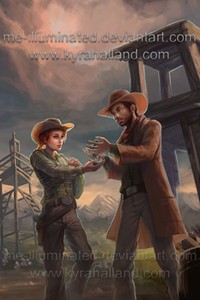 So I finished the first draft of Book 4 of Daughter of the Wildings and was planning Book 5, when one night it came to me, as I was brushing my teeth, that there needs to be a sixth book in the series. I panicked, wondering if there was enough story left to make up a whole other book. But as I thought about it that night (I usually lay awake late at night working out plots and story problems in my mind) and sat down and did a bunch of scene brainstorming and story development the next day, I realized that yes, there does have to be a sixth book, and there's plenty of story for two books instead of one. So a Book 6 there will be. I think I've known, way deep down, for a long time that it would take another book to finish off the series properly. For a long time I had envisioned the events of Book 5, which moves the story from the frontier - the Wildings - into the civilized land of Granadaia, as being the climactic events of the series. But that just didn't seem right. The series is called Daughter of the Wildings, and it's about that uncivilized frontier land, its unique magic, and the connection between Lainie Banfrey (the Daughter in the series) and the land and its magic. Finishing it off in Granadaia without coming back to what is the heart of the series would be an unsatisfactory ending that doesn't fit with what the series is about. The more I thought about it, the more I realized that the events in Granadaia are the leadup to the climactic events, and not the actual climax themselves. The story has to come back to the Wildings, to the threats to the land and the people that have been building up through all the other books, and to the real significance of Lainie's unique power and her relationship to the land, and also integrate Silas fully into that relationship, in order to tie everything together and bring the story to a meaningful and satisfying conclusion. As I thought this through, I thought that maybe the Granadaia part and the return to the Wildings part could just be two halves of the same book. But the more I developed the storyline, the more it became clear that the two halves of the book are also two totally different story lines, each with its own central story problem, instigating events, development, and conclusion. I aso realized that if the book was going to be an equivalent length with the previous books in the series, I was going to have to skim over or leave out a lot of important stuff, or else the book was going to be twice as long as the other books. Therefore, the obvious answer, which waited for that brainless and bored moment of brushing my teeth to hit me upside the head, is to split "Book 5" into two books. I think I'm about ready to start writing the last two books. As with the other books so far in the series, there's this feeling of jumping into the deep end without really knowing how deep the water is or what's waiting in there. I know where the books start, and where they end, and have a general idea of what happens in between, but very few of the details are clear. But so far it's worked out well, so I just have to make that leap of faith two more times. I think I'll just write straight through, without stopping between books 5 and 6, since I'd already been planning them as a single unit. With hard work and a minimum of interruptions, I hope to finish the drafts of both books by October. So, yay! More time with Silas and Lainie! And none of this is even taking into consideration my idea for a possible follow-up series. Note on the story blurbs for Daughter of the Wildings: All six are up. I apologize for any cheesiness, especially in the last few. Writing blurbs is hard, especially if you're trying not to give away any spoilers. And I want to stipulate that in my books, suggesting that the hero and heroine end up together is not a spoiler. In addition to being fantasy, my books are also romance, and to be a proper romance (as opposed to more general love story), you have to have the Happily (even if things aren't easy) Ever After. It's expected, as a hallmark of the genre. (Plus I hate unhappy endings.) The question isn't if they end up together, but how. In the meantime, edits on The Lost Book of Anggird are progressing apace (I'm planning a blog post on the worst writing advice ever and how it nearly killed Lost Book), along with the first major revision of Sarya's Song. Maybe I'll do a post on that too, how I struggled with it for years, then applied some very helpful story-planning techniques, and now have the least-broken first draft I think I've ever written. |
AuthorI am Kyra Halland, author of tales of fantasy, heroism, and romance. Sign up for my email list
My Books
More Books
Click on the covers for more information
Categories
All
Archives
January 2023
Kyra Halland: Welcome to My Worlds is a participant in the Amazon Services LLC Associates Program, an affiliate advertising program designed to provide a means for sites to earn advertising fees by advertising and linking to amazon.com.
Other links on this site may also lead to products for which the owner may receive compensation. This website uses marketing and tracking technologies. Opting out of this will opt you out of all cookies, except for those needed to run the website. Note that some products may not work as well without tracking cookies. Opt Out of Cookies |
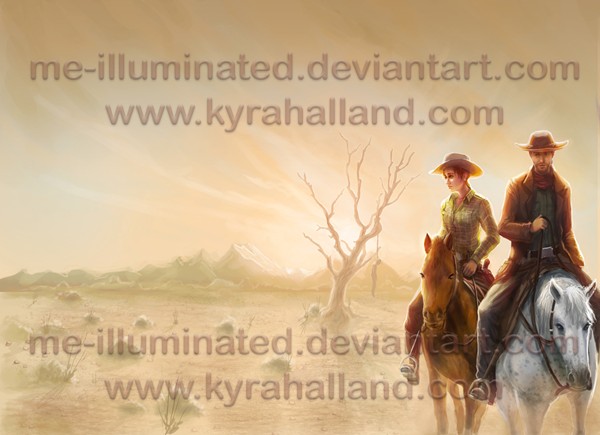
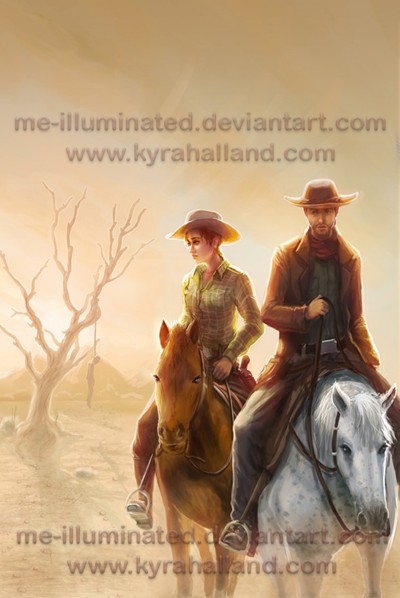
 RSS Feed
RSS Feed
